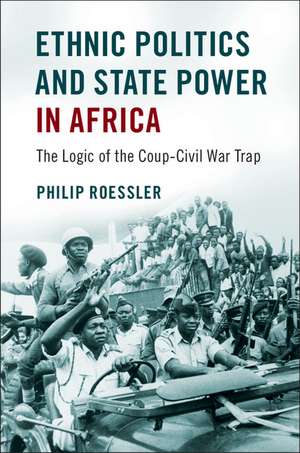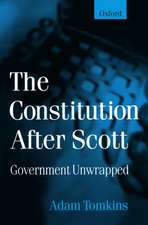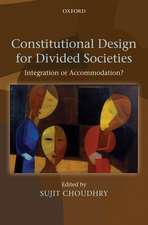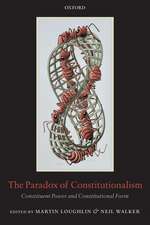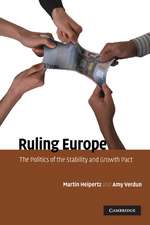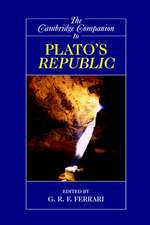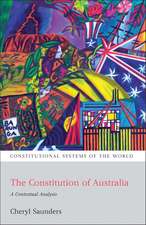Ethnic Politics and State Power in Africa: The Logic of the Coup-Civil War Trap
Autor Philip Roessleren Limba Engleză Paperback – 14 dec 2016
| Toate formatele și edițiile | Preț | Express |
|---|---|---|
| Paperback (1) | 286.61 lei 6-8 săpt. | |
| Cambridge University Press – 14 dec 2016 | 286.61 lei 6-8 săpt. | |
| Hardback (1) | 725.66 lei 6-8 săpt. | |
| Cambridge University Press – 14 dec 2016 | 725.66 lei 6-8 săpt. |
Preț: 286.61 lei
Nou
Puncte Express: 430
Preț estimativ în valută:
54.84€ • 58.65$ • 45.73£
54.84€ • 58.65$ • 45.73£
Carte tipărită la comandă
Livrare economică 18 aprilie-02 mai
Preluare comenzi: 021 569.72.76
Specificații
ISBN-13: 9781316628218
ISBN-10: 1316628213
Pagini: 414
Ilustrații: 13 b/w illus. 6 maps 18 tables
Dimensiuni: 152 x 228 x 23 mm
Greutate: 0.57 kg
Editura: Cambridge University Press
Colecția Cambridge University Press
Locul publicării:New York, United States
ISBN-10: 1316628213
Pagini: 414
Ilustrații: 13 b/w illus. 6 maps 18 tables
Dimensiuni: 152 x 228 x 23 mm
Greutate: 0.57 kg
Editura: Cambridge University Press
Colecția Cambridge University Press
Locul publicării:New York, United States
Cuprins
Part I. Motivation and Central Argument: 1. Introduction; Part II. Puzzle and Theory: 2. A meso-level approach to the study of civil war; 3. Theories of ethno-political exclusion; 4. The strategic logic of war in Africa; Part III. Theory-Building Case Study: 5. Political networks, brokerage and cooperative counterinsurgency: civil war averted in Darfur; 6. The strategic logic of ethno-political exclusion: the breakdown of Sudan's Islamic movement; 7. Political exclusion and civil war: the outbreak of the Darfur civil war; Part IV. Testing the Argument: 8. Empirical analysis of the coup-civil war trap; 9. A model-testing case: explaining Africa's Great War; Part V. Extensions: 10: The strategic logic of peace in Africa; 11. Conclusion.
Recenzii
'This is the best book on civil war I have read in quite a while. Drawing on first-rate, relatively traditional 'shoe leather' fieldwork, Roessler makes a genuine theoretical breakthrough in how to understand civil war onset in many developing countries.' James D. Fearon, Theodore and Frances Geballe Professor, School of Humanities and Sciences, Stanford University
'Roessler has written a path-breaking contribution to political science in Africa, ably combining study of the nature of the post-colonial state and of political agency by contending elites. This book is a rich account, based on multiple methods, that superbly fuses the analysis of civil wars and coups d'état into a single cogent account, that places struggles for state power where they belong - right at the center of the explanation for armed conflict and contentious politics.' Alex de Waal, Executive Director of the World Peace Foundation, The Fletcher School of Law and Diplomacy, Tufts University, Massachusetts
'Scholars have long wondered why leaders of fragile states would exclude representatives of minority groups from the centers of power if they could mobilize their co-ethnics in rebellion. Philip Roessler's remarkable book is the first to provide a convincing answer. It is deeply engaged in field observations from Sudan, compelling in theoretical simplicity, and committed to generality through statistical tests. In a trade-off between a coup d'état from within the palace and a civil war coming from a far periphery, presidents prefer the latter and thereby risk the rebellion initiated by violence entrepreneurs mobilizing the excluded minority. Africanists, comparativists, international relations experts, and the policy community will all profit from this extraordinary treatise.' David D. Laitin, James T. Watkins IV and Elise V. Watkins Professor of Political Science, Stanford University
'War, coups, and ethnicity form a deadly triangle, and in this study, Philip Roessler probes their origins and interrelations. In so doing he teaches us not only about Africa but about politics throughout much of the developing world. A significant contribution.' Robert H. Bates, Eaton Professor of the Science of Government, Harvard University
'Roessler's superb analysis of civil wars and coups stresses 'meso-level' connections between regimes and society. … This book includes detailed case studies of the two Darfur uprisings in Sudan and the continent's 'Great War' in the Congo. … Civil war, he argues, resulted from strategic choices made by rulers, backed by their co-ethnics, to coup-proof their regimes. Rulers can be caught in traps that risk civil wars or coups. However, should the capital city be threatened and the rival be strong, power sharing can result. Roessler buttresses this fascinating conclusion with statistically tested data from the Ethnic Power Relations data set. His research is exceptionally thorough: 18 months' fieldwork in Darfur; scores of footnotes per chapter; wide-ranging references. Even better, Roessler's theory can be utilized by scholars analyzing threats to political regimes in multiethnic societies outside Africa. [This] ranks as one of the best recent publications.' CHOICE
'Roessler's work makes important contributions to scholarship in comparative politics and security studies. By placing ethnic politics and the shadow of coups at the core of rulers' strategies for political survival in Africa, the book adds significant depth to our understanding of African politics. Its focus on the importance of rulers' bargaining over state power as a source of conflict also complements existing explanations of civil war that disproportionately emphasize the role of rebel behaviour.' Juste Codjo, International Studies Review
'Roessler has written a path-breaking contribution to political science in Africa, ably combining study of the nature of the post-colonial state and of political agency by contending elites. This book is a rich account, based on multiple methods, that superbly fuses the analysis of civil wars and coups d'état into a single cogent account, that places struggles for state power where they belong - right at the center of the explanation for armed conflict and contentious politics.' Alex de Waal, Executive Director of the World Peace Foundation, The Fletcher School of Law and Diplomacy, Tufts University, Massachusetts
'Scholars have long wondered why leaders of fragile states would exclude representatives of minority groups from the centers of power if they could mobilize their co-ethnics in rebellion. Philip Roessler's remarkable book is the first to provide a convincing answer. It is deeply engaged in field observations from Sudan, compelling in theoretical simplicity, and committed to generality through statistical tests. In a trade-off between a coup d'état from within the palace and a civil war coming from a far periphery, presidents prefer the latter and thereby risk the rebellion initiated by violence entrepreneurs mobilizing the excluded minority. Africanists, comparativists, international relations experts, and the policy community will all profit from this extraordinary treatise.' David D. Laitin, James T. Watkins IV and Elise V. Watkins Professor of Political Science, Stanford University
'War, coups, and ethnicity form a deadly triangle, and in this study, Philip Roessler probes their origins and interrelations. In so doing he teaches us not only about Africa but about politics throughout much of the developing world. A significant contribution.' Robert H. Bates, Eaton Professor of the Science of Government, Harvard University
'Roessler's superb analysis of civil wars and coups stresses 'meso-level' connections between regimes and society. … This book includes detailed case studies of the two Darfur uprisings in Sudan and the continent's 'Great War' in the Congo. … Civil war, he argues, resulted from strategic choices made by rulers, backed by their co-ethnics, to coup-proof their regimes. Rulers can be caught in traps that risk civil wars or coups. However, should the capital city be threatened and the rival be strong, power sharing can result. Roessler buttresses this fascinating conclusion with statistically tested data from the Ethnic Power Relations data set. His research is exceptionally thorough: 18 months' fieldwork in Darfur; scores of footnotes per chapter; wide-ranging references. Even better, Roessler's theory can be utilized by scholars analyzing threats to political regimes in multiethnic societies outside Africa. [This] ranks as one of the best recent publications.' CHOICE
'Roessler's work makes important contributions to scholarship in comparative politics and security studies. By placing ethnic politics and the shadow of coups at the core of rulers' strategies for political survival in Africa, the book adds significant depth to our understanding of African politics. Its focus on the importance of rulers' bargaining over state power as a source of conflict also complements existing explanations of civil war that disproportionately emphasize the role of rebel behaviour.' Juste Codjo, International Studies Review
Notă biografică
Descriere
This book models the trade-off that rulers of weak, ethnically-divided states face between coups and civil war.
